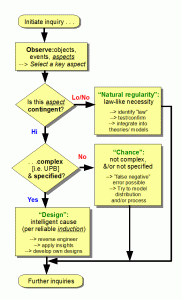In comment 30 to this post Elizabeth Liddle writes:
I can think of lots of ways of testing specific design hypotheses, but they all involve a hypothesis involving a postulated designer. And IDists insist that this is irrelevant – that “Design detection” should only involve the observed pattern, not any hypothesis about the designer. This is ludicrous, frankly.
Let’s explore one of Lizzie’s prior forays into design detection, and we’ll leave it up to the onlookers to decide which side is “ludicrous.”
In a prior post I posed the following question to Dr. Liddle:
If you were to receive a radio signal from outer space that specified the prime numbers between 1 and 100 would you conclude (provisionally pending the discovery a better theory, of course) that the best theory to account for the data is ‘the signal was designed and sent by an intelligent agent?’
Dr. Liddle responded:
Yes. And I’ve explained why.
She expanded on her explanation:
Barry, I did NOT make the inference ‘based upon nothing but the existence of CSI’!
My inference had nothing to do with CSI.
It was a Bayesian inference based on two priors:
My priors concerning the probability that other parts of the universe host intelligent life forms capable of sending radio signals (high)
My priors concerning the probability that a non-intelligent process might generate such a signal (low).
Dr. Liddle’s problem can be summarized as follows:
1. Denying the design inference based on the prime number sequence is not an option. The inference is so glaringly obvious that to deny it would be absurd. Even arch-atheist Carl Sagan admitted this signal was obviously designed (when he used it as the basis of his book “Contact”). Therefore, were Dr. Liddle to deny the obvious design inference she would instantly lose all credibility.
2. So she asks herself: “How can I admit the design inference while continuing to deny the methods of ID proponents?”
3. Her solution: “I know. I’ll admit the design inference but cover up my admission with Bayesian fuzziness, and that will obscure the fact that I used the methods of the ID proponents while I continue to denounce those very methods.”
Notice how Dr. Liddle’s Bayesian “priors” add absolutely nothing to the design detection methods advocated by ID proponents. Here is a graph of the explanatory filter:
Let’s run the prime number sequence through the explanatory filter to see how.
1. We observe an event (i.e. a radio signal specifying the prime numbers between 1 and 100).
2. Is it highly contingent? Yes. We can exclude mechanical necessity.
3. Is it highly complex and specified? Yes. We can exclude chance.
4. The best explanation for the data: Design.
Now let’s see if Dr. Liddle’s Bayesian analysis adds anything to what we already have.
Prior 1: Estimate of the probability that other parts of the universe host intelligent life forms capable of sending radio signals: High
It is obvious that one’s prior estimate of the probability of the existence of intelligent life forms in other parts of the universe is utterly irrelevant to the design inference. How do I know? By supposing the exact opposite of course. Let’s assume that a person believes there is practically zero chance that other parts of the universe have intelligent life (as we have seen on this site, there is very good reason to believe this). If that person were to receive this signal he would have to revise his conclusion, because the signal is obviously designed.
We see, therefore, that whether one’s Bayesian prior regarding the probability of the existence of intelligence life forms is 0% or 100% makes absolutely no difference to the design inference. From this we conclude that Dr. Liddle’s first prior adds nothing to the analysis.
Prior 2: Estimate of the probability that a non-intelligent process might generate such a signal: Low
This, of course, is the explanatory filter by another name. How do we know that the probability that a non-intelligent process might generate such a signal is low? Because it is highly continent, complex and specified.
It is important to see two things:
1. When Dr. Liddle correctly inferred design from the prime number sequence she had one and only one data point: A radio signal specifying the primes between 1 and 100.
2. Dr. Liddle knew nothing about the provenance of the radio signal. In other words she made a design inference based on nothing but the pattern itself while knowing absolutely nothing about the designer. When she made her design inference she did not first make a hypothesis based on the “postulated designer,” for the simple reason that there was not a scintilla of data upon which to base that hypothesis other than the pattern itself.
Conclusion: Though she tried to cover it up with Bayesian fuzziness, Dr. Liddle did the very thing she now says is “ludicrous.”
